|
|
|
Sort Order |
|
|
|
Items / Page
|
|
|
|
|
|
|
| Srl | Item |
| 1 |
ID:
190314
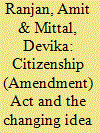

|
|
|
|
|
| Summary/Abstract |
In 2019, the Indian parliament adopted the Citizenship (Amendment) Act, which grants citizenship to non-Muslims ‘persecuted’ minorities such as Hindus, Sikhs, Buddhists, Jains, Parsis or Christians from Afghanistan, Bangladesh and Pakistan. Protests were held against the CAA in various parts of India. For protestors, the CAA is contrary to the secular character of the Indian citizenship. Supporters of the CAA also held rallies enumerating its benefits. This paper traces the historical evolution of the constitutional debates and changes in the Indian citizenship rules, and examines the socio-political impact of the CAA.
|
|
|
|
|
|
|
|
|
|
|
|
|
|
|
|
| 2 |
ID:
190310
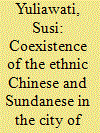

|
|
|
|
|
| Summary/Abstract |
There has been much discussion of Indonesia’s changing policies toward ethnic Chinese and the phenomenon of anti-Chinese sentiment. However, cases where Chinese Indonesians and native Indonesians live peacefully side by side are worth investigating. This paper explores the notable tolerance and maintenance of a relatively peaceful coexistence between the Sundanese and Chinese in areas with peaceful relations of long standing between their communities. In particular, we investigate the area called Kampung Toleransi (Kampong of Tolerance), an officially designated name of the City Government of Bandung in 2018. The results show that Kampung Toleransi is a symbol of a religious and ethnic harmony. We argue that it is self-evident that the two ethnicities are living harmoniously due to general tolerance of religious and ethnic differences. By maintaining peaceful coexistence, the two communities obtain mutual benefit.
|
|
|
|
|
|
|
|
|
|
|
|
|
|
|
|
| 3 |
ID:
190311
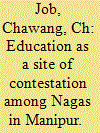

|
|
|
|
|
| Summary/Abstract |
This article is an attempt to understand education in light of the complex multiethnic relationships and politics prevailing in the state of Manipur. With the sustained tension between the Nagas, Kukis, and Meiteis over the matter of identity, education in the state remains massively divided along ethnic lines. That said, the Meiteis, as the ethnic majority, have been systematically influential in prioritising their identity and development in education, as its control remains in their purview. The subsequent claim and counterclaim regarding the imposition of the dominant Meitei language and culture in the school curriculum have further worsened the ethnic relationship. Consequently, the perceived sense of alienation by the tribal minorities in this sense has added to their sectarian aspirations and detachment from the state. Thus, through fieldwork and a review of literature, this paper presents the various discourses concerning the complex tussle over the control of resources and governance in the education system of Manipur.
|
|
|
|
|
|
|
|
|
|
|
|
|
|
|
|
| 4 |
ID:
190309
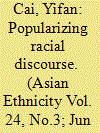

|
|
|
|
|
| Summary/Abstract |
The rise of social media has enabled Chinese migrants in the global south to participate in the production of racial knowledge from grassroots perspectives, adding complexity and dynamism to the racial discourse that was dominated by political and intellectual elites historically. This study investigates anti-black racial discourse on the popular short-video and live-streaming app in China, Kuaishou, where many Africa-based vloggers share their daily life experiences. This study examines the visual and verbal representation of Africans, focusing on 50 short videos posted by Africa-based Chinese and the comments made on them. The analysis shows that the racialization of Africans on Kuaishou is a multilayered process shaped by the intersection of race with other dimensions of identity, including class, gender, and nationality. This paper further illuminates the cultural embeddedness of these thoughts in a South-South setting, and discusses the impacts of different historical-ideological resources on racial thinking in the Chinese context.
|
|
|
|
|
|
|
|
|
|
|
|
|
|
|
|
| 5 |
ID:
190308
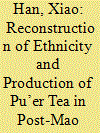

|
|
|
|
|
| Summary/Abstract |
In post-Mao China, the Bulang ethnic group in Yunnan province use Pu’er tea cultivation as a primary way of reconstructing their ethnic identities and cultural traditions. In this paper, I argue that in the process of ethnicization, material culture is a critical factor in addition to myth, history, religions, and cultures, rooted in a historical process of forming ethnic identities, based on a six-month participant observation in Mangjing Village with local tea farmers. I further argue that the Bulang people’s reconstruction of ethnicity can be seen as an incorporation between the majority (state power) and the minority (ethnic people in frontiers) and is constituted by both external and internal factors. I also highlight that Pu’er tea functions as a particularly meaningful material agency when looking at how the Bulang people in Mangjing proactively respond to state power manipulation, mobilize social relations, and engage with a larger commercial market in the modern world.
|
|
|
|
|
|
|
|
|
|
|
|
|
|
|
|
| 6 |
ID:
190313
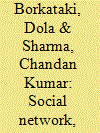

|
|
|
|
|
| Summary/Abstract |
Land alienation among its tribal communities has been one of the most disquieting issues in contemporary India despite existing laws for the protection of tribal land and habitat. This situation is attributed mainly to requisition of tribal land for various developmental activities undertaken by the state as well as its indifference in enforcing the existing laws. The situation in Assam clearly illustrates this. Despite the existing laws, the tribal communities have been unable to retain their ownership of the land. This paper shows that while the state-led development activities are significantly responsible for this, the various informal ways in which the transfer of tribal land takes place at a private level are also no less alarming. Explicating the dynamics behind this process, the paper divulges the multiple informal mechanisms, embedded in community network and trust at the local level to negotiate the protective land laws to facilitate the transfer of tribal land to non-tribal communities.
|
|
|
|
|
|
|
|
|
|
|
|
|
|
|
|
| 7 |
ID:
190307


|
|
|
|
|
| Summary/Abstract |
Academic research focused on Tibetan women-in-exile is rare. Also, very few existing studies explore the perspectives of Tibetan women on the Tibetan nation and their contributions to Tibetan nationalism. Therefore, considering this gap in the literature, this paper explores the question of the Tibetan nation from the perspectives of Tibetan women-in-exile and seeks to understand their contributions to Tibetan nationalism. The paper draws from qualitative interviews conducted with Tibetan women in Dharamsala. The findings indicate that as agents and symbols of nationalism, educated Tibetan women-in-exile express ambivalence in their ideas of Tibetan women’s contributions to Tibetan nationalism. Their narratives help us expand our understanding of Tibetan nationalism and reveal how women as active agents of nationalism contribute to the Tibetan movement. At the same time, the paper argues, the Tibetan women-in-exile have not escaped the symbolism of nationalism attributed to them by the larger Tibetan society.
|
|
|
|
|
|
|
|
|
|
|
|
|
|
|
|
| 8 |
ID:
190312
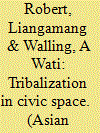

|
|
|
|
|
| Summary/Abstract |
The Naga, comprised of various tribes, were traditionally governed by independent village republics. The inclusion of the Naga areas into the modern Indian State has been opposed, ensuing in a long-drawn armed struggle for sovereignty. Military measures have been used to deal with this struggle. Naga society is characterized by dualities in the form of the categorization of tribes as an administrative category against the discourse of a greater Naga identity, experiences of electoral politics to the Naga indigenous form of democracy rooted in the village republic, and the protracted Naga political struggle to the idea of Nagaland state as a solution, among many others. These dualities have shaped collective actions in the forms of associations and organizations to constitute the Naga civil society. The paper examines the socio-political realities and the resulting collective actions as a dimension of civil society.
|
|
|
|
|
|
|
|
|
|
|
|
|
|
|
|
|
|
|
|
|